-
Courses

Courses
Choosing a course is one of the most important decisions you'll ever make! View our courses and see what our students and lecturers have to say about the courses you are interested in at the links below.
-
University Life

University Life
Each year more than 4,000 choose University of Galway as their University of choice. Find out what life at University of Galway is all about here.
-
About University of Galway

About University of Galway
Since 1845, University of Galway has been sharing the highest quality teaching and research with Ireland and the world. Find out what makes our University so special – from our distinguished history to the latest news and campus developments.
-
Colleges & Schools

Colleges & Schools
University of Galway has earned international recognition as a research-led university with a commitment to top quality teaching across a range of key areas of expertise.
-
Research & Innovation

Research & Innovation
University of Galway’s vibrant research community take on some of the most pressing challenges of our times.
-
Business & Industry

Guiding Breakthrough Research at University of Galway
We explore and facilitate commercial opportunities for the research community at University of Galway, as well as facilitating industry partnership.
-
Alumni & Friends

Alumni & Friends
There are 128,000 University of Galway alumni worldwide. Stay connected to your alumni community! Join our social networks and update your details online.
-
Community Engagement

Community Engagement
At University of Galway, we believe that the best learning takes place when you apply what you learn in a real world context. That's why many of our courses include work placements or community projects.
2012
All 2012
Viscus Biologics Awarded Biomaterials Commercialisation Licence by National University of Ireland Galway
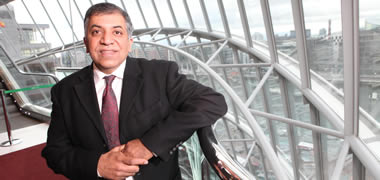
Tuesday, 30 October 2012
Viscus Biologics LLC, Cleveland, Ohio, has secured an 18-month option to conduct further research into the development and commercialisation of a new tissue repair material developed by the Network of Excellence for Functional Biomaterials (NFB) at National University of Ireland, Galway. Research on the technology is being carried out by Viscus Biologics at its facility in Cleveland, Ohio. The technology is the result of ongoing research at NFB to develop novel biomaterials for soft tissue repair in reconstructive surgery and chronic wound healing. The new technology, called cholecyst-derived extracellular matrix (CEM), is derived from a gallbladder from which the native cells have been removed to leave behind a mesh-like collagen structure. This structure may then be stabilised by various chemical techniques. The nano-topography of the CEM makes it ideal for supporting new cell growth while its mechanical properties ensure that it has the strength and elasticity required for tissue repair. Furthermore the CEM is completely reabsorbed by the body over time, making further surgery for its removal unnecessary. Some of the initial work was funded by Enterprise Ireland and subsequently by Science Foundation Ireland. Viscus Biologics is affiliated with Galway based Proxy Biomedical, Ltd, a leading innovator in the development of next generation medical products using proprietary biomaterials technology. “We are delighted to enter into this collaboration with NFB and look forward to developing the full potential of the cholecyst technology developed by Professor Pandit,” commented Dr Thomas Neenan, President and CEO of Viscus Biologics. “Our Irish parent company, Proxy Biomedical, Ltd has enjoyed a long a fruitful relationship with National University of Ireland Galway, and we look forward to a similar productive relationship as we bring innovative technology such as the cholocyst platform to the market.” Viscus Biologics’ products provide surgeons with a variety of innovative surgical products with three-dimensional structures and properties similar to those found in native tissue. The company’s first product ALLOMEMTM (human peritoneal tissue) is currently marketed in the US. NFB, which was established with funding from SFI under the Strategic Research Cluster Programme, conducts research on biomaterials, developing technologies for use in clinical applications in the fields of orthopaedics, soft-tissue healing and neural and cardiovascular regeneration. -ends-
>> Read full story about Viscus Biologics Awarded Biomaterials Commercialisation Licence by National University of Ireland Galway
NUI Galway Students Win Four International Undergraduate Awards
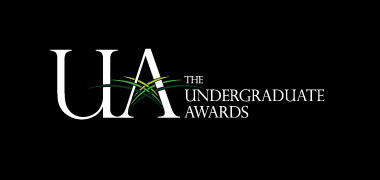
Wednesday, 25 September 2013
Winners were selected from almost 4,000 submissions from 180 institutions worldwide Four NUI Galway students are winners of the 2013 Undergraduate Awards - an international academic awards programme that identifies top students across the globe through their innovative undergraduate research. A further five NUI Galway students were highly commended. Marcus Byrne was announced winner of the Classical Studies and Archaeology category award for his paper entitled Inferring Status From Early Bronze Age Burial whilst Aisling Ní Churraighín secured a win in the Irish Language, Literature and Folklore catergory for her essay Seán Ó hEochaidh – Bailitheor Béaloideasa in Iardheisceart Thír Chonaill sna 1930aidí: Léargas ón Dialann. Joining them as winners were Khai El Baba Jones in the Philosophical Studies and Theology category with his essay Faith in Kant: The religiosity of moral faith and its relation to ecclesiastical faith in Kant’s thought and John Birrane for his essay on Is There a Need for Positive Psychology?which bagged him an award in the Psychology category. John’s essay not only won the Irish category for Psychology, but also won the overall international award. Judged by a panel made up of academics and industry experts from each field, the winning essays were selected from almost 4000 submissions in over 180 colleges and universities across the globe, to be named the best undergraduate in their field. Congratulating the students, NUI Galway President, Dr Jim Browne said: "The success of these talented students highlights the high quality of study which our undergraduate students are engaged in. Their success in these Awards will undoubtedly add lustre to their academic development, as well as underscore NUI Galway’s increasing profile as a centre of world-class research and teaching". He continued by wishing them continued success in their academic endeavours. The four winning NUI Galway students, along with the 39 other UA winners, will be brought to Dublin for the UA Summit from 13-15 November. Highly Commended students will also have the opportunity to attend the Summit by purchasing a ticket to the three-day event. The Summit is designed to celebrate these outstanding students from across the world, and to inspire them with speakers assembled from a diverse range of backgrounds. For further information on the UA Summit and the results of the 2013 Undergraduate Awards, please see www.undergraduateawards.com. -Ends-
>> Read full story about NUI Galway Students Win Four International Undergraduate Awards
NUI Galway Lecturer Wins MIT Innovation Award for Research on Ideas
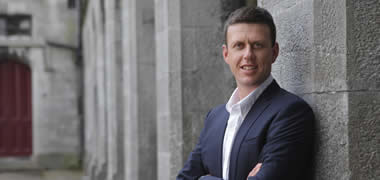
Wednesday, 25 September 2013
Research identified the key distinction between ‘idea scouts’ who introduce new ideas and ‘idea connectors’ who help make them a reality. NUI Galway Lecturer in Business Information Systems Dr Eoin Whelan is the winner of the prestigious 2013 Richard Beckhard Memorial Prize awarded by the Massachusetts Institute of Technology (MIT) Sloan Technology Review for the ‘most outstanding’ article published on Enterprise Social Media. The article titled ‘Creating Employee Networks That Deliver Open Innovation’ is authored by Dr Eoin Whelan, Salvatore Parise, Jasper de Valk and Rick Aalbers. They examine how companies such as Procter & Gamble, Cisco Systems, Genzyme, General Electric and Intel are often acknowledged innovation leaders. The authors argue that others have failed to match them because the mix of external and internal ideas for innovation doesn’t happen as efficiently. The authors identified, and mapped, the mix of real-life and virtual connections that go into bringing an idea to fruition. They identified ‘idea scouts’ who, often sourcing information on the web, combine that with their company’s expertise to come up with an idea. The authors also identified, however, ‘idea connectors’ who have the interpersonal skills and informal contacts to get the buy-in to make those ideas a reality. Interestingly ‘idea connectors’ aren’t necessarily employed as such, or can come from any level, senior or junior, in the organisation. Dr Eoin Whelan said, ‘we’re very honoured to receive this prestigious award, and hope that it will focus further attention on our research in social media in enterprise. The research is, we feel, of particular benefit to senior managers and R&D leaders to identify, encourage and reward the idea scouts and connectors for their work in bringing ideas to life.” A member of the award winning NUI Galway Cairnes School of Business, Public Policy and Law, Dr Whelan, from Portlaoise, Co. Laois, lectures in Business Information Systems, and his research focuses on how technologies such as social media and big data both enable and constrain organisational innovation and productivity. The NUI Galway Business Information Systems degree course in the Cairnes School is one of only eight European undergraduate programmes to receive five-year EPAS (European Foundation for Management Development) accreditation. -ends-
>> Read full story about NUI Galway Lecturer Wins MIT Innovation Award for Research on Ideas
Packed Programme for Friday’s Sea2Sky Generating Huge Interest
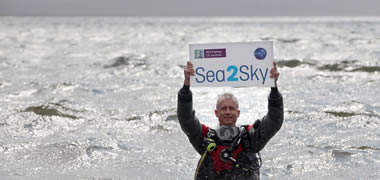
Tuesday, 25 September 2012
There has been huge interest in the free research festival, Sea2Sky on Friday 28 September, according to organisers NUI Galway. With free access to the ‘Accelerating Science’ exhibition in Leisureland, over 40 stands in the Galway Bay Hotel showcasing local research, and open access to the Atalantaquaria, interest is high. While school visits will take place throughout the day, the public are invited to attend the event from early afternoon. Celebrating the natural physical world from the marine, through the atmosphere to space, the free, family event will see hundreds of researchers share their work with the public. For those with an interest in space and astronomy a Science Cafe discussing the topic "Is the future of Space Human or Robotic" will take place in the evening where expert panellists in Galway and Cork will discuss the topic during a live link-up with former NASA astronaut Dan Tani in California. There will also be a Planetarium Show with CIT Blackrock Castle Observatory and 3D Tours of the Universe, while Galway Astronomy Club will provide guided use of telescopes to view night sky. For matters marine, local scuba divers are to give an exhibition in the aquarium, the Marine Institute will showcase their Remote Operated Vehicle (ROV) and a Japanese Oyster Farmer will speak in conjunction with the Galway Oyster Festival. Thousands are expected to visit Salthill in Galway on the night, to participate in experiments, competitions and quizzes, to watch demonstrations and simulations, to exchange ideas and get to know the researchers. “We had over 10,000 visitors last year, as the event spills out onto the Prom in Salthill, we blend research and science with art and innovation at this event. We have puppet shows, art exhibitions made from recycled materials, murals, flying fish, and a photo competition”, explains chief organiser, NUI Galway’s Dr Andrew Shearer, a lecturer in physics. Sea2Sky is part of European Researchers Night, which takes place on Friday, 28 September, across 800 venues in 320 cities. Máire Geoghegan-Quinn, European Commissioner for Research, Innovation and Science, will officially open the Irish event. Sea2Sky is organised by NUI Galway, with huge support from partners the Marine Institute and Galway Atlantaquaria, and CIT Blackrock Castle Observatory in Cork. As part of the European Researchers Night 2012 organisers of the Sea2Sky event are asking all young photographers to submit photographs to the free competition entitled ‘Earth, Wind and Fire’. Open to students of all ages across Irish primary and post-primary schools, the aim is to encourage talented young photographers to capture unique moments incorporating marine, atmosphere and astronomy. To view the full day and night programme, or for more information about the photography exhibition, visit www.sea2sky.ie -ends-
>> Read full story about Packed Programme for Friday’s Sea2Sky Generating Huge Interest
Irish Scientist Takes on Incurable Cancer with HRB Award
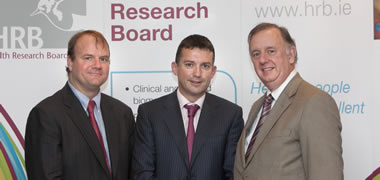
Wednesday, 26 September 2012
The Health Research Board (HRB) has announced it is to invest €11 million to build the capacity of research leadership in hospitals through its clinician scientist programme. One of the clinician scientists chosen is Michael O’Dwyer, Professor of Haematology at NUI Galway and Consultant Haematologist, University Hospital Galway, who will head up a €1.7 million project. Professor O’Dwyer aims to increase our understanding of the white blood cell cancer called Multiple Myeloma (MM). Despite major advances in treatment, MM remains incurable, and in patients with high-risk disease, who account for up to 25% of patients, life expectancy is less than three years. MM is the second most common blood cancer in Ireland with approximately 250 new cases each year. It typically affects older individuals with two thirds of patients over 65 years of age and as the population ages the incidence and prevalence is increasing. Throughout the lifetime of this programme Professor O’Dwyer, in collaboration with NUI Galway’s and Trinity College Dublin's Professor Frank Giles, will make emerging new therapeutics from all sources available to myeloma patients in early phase clinical trials through the HRB funded Clinical Research Facilities. Ultimately however, the goal is to translate their own laboratory findings to the clinic for the benefit of patients. “Our goal is to discover new ways to reduce the ability of the cancer cell to move to other sites within the body and identify new ways to make the cancerous cells more sensitive to chemotherapy drugs”, explains Professor O’Dwyer. “Ultimately, the laboratory findings will be applied to the clinic with the intention of improving treatment options for MM patients.” According to Enda Connolly, Chief Executive of the HRB: “The best hospitals in the world have research at their core. The HRB Clinician Scientist Awards is part of our strategic aim to develop a culture of research and innovation in the health services, both for the benefit of patients and the Irish economy.” Professor O’Dwyer will work with a network of scientific experts in NUI Galway and elsewhere around Ireland. Co-applicants on the grant are Professor Afshin Samali, Professor Lokesh Joshi and Professor Corrado Santocanale of NUI Galway, Professor Paul Browne of Trinity College Dublin and Dr Irene Ghobrial of the Dana Farber Cancer Institute, Boston. Additional academic collaborators include the Myeloma Ireland Consortium and the Mayo Clinic Scottsdale, Arizona as well as several industry partners. The Science Bit Professor O’Dwyer and his team plan to focus on two particular aspects of multiple myeloma biology. These are the vulnerability of plasma cells to excessive protein loads causing a phenomenon known as ‘ER stress’ and the role that glycosylation plays in the interaction of myeloma cells with the bone marrow microenvironment and vasculature, allowing them to traffic or metastasize from one location to another. Myeloma cells produce vast amounts of protein antibodies, which are assembled in the endoplasmic reticulum or ER. Excessive levels of protein are toxic, leading to ER stress and cell death. Myeloma cells are adapted to deal with ER stress by increasing the activity of a protective pathway involving the IRE1 kinase. The presumption is that blocking this pathway should make myeloma cells more vulnerable to ER stress. A major focus of this program is the evaluation of IRE1 inhibition as a new therapeutic option for multiple myeloma. Professor O’Dwyer and his team believe that the sugar coating or glycosylation status of myeloma cells plays an important role in trafficking, for example influencing the interaction between adhesion molecules called selectins and their ligands on myeloma cells. In this project they aim to explore the differences in glycosylation status between myeloma cells and their normal counterparts and their functional significance. They aim to identify novel new therapeutic targets, reducing the metastatic potential of myeloma cells and overcoming drug resistance. They are also evaluating the myeloma activity of a novel selectin inhibitor. -ends-
>> Read full story about Irish Scientist Takes on Incurable Cancer with HRB Award















